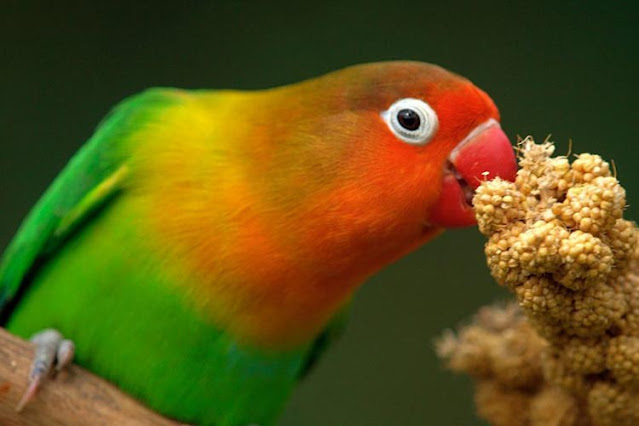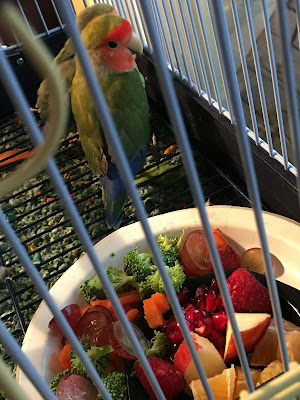Lovebirds are intelligent and affectionate birds. They are okay for beginners, but require a bit more work than other species. They are best kept as pairs, since they require so much attention and affection.
Formulated Food
A formulated diet provides a good nutritional base so does not require the addition of vitamins. However it does not contain the phytonutrients (antioxidant pigments) that are found in vegetables, fruits, grains, and seeds. Phytonutrients are believed to boost the immune system, help a body to heal itself, and to prevent some diseases. Also, parrots can become bored with formulated diet due to the lack of variety.
Seed Food
A seed only diet offers much more variety but requires additional vitamin and calcium supplements. Lovebirds need not only nutritional requirements met but also variety for psychological enrichment.
A lovebirds's diet will consist of 1 1/2 to 2 ounces (45-60 grams) of feed daily for a single bird. A diet consisting of a small parrot mix along with a variety of supplements and vitamins is generally regarded as suitable. Also a formulated diet along with greens, fruits, and vegetable supplements but without additional vitamins is also regarded as suitable, and is a more current trend.
Supplements
Supplements include fresh vegetables, greens, tree branches for the bark, some fruits, and millet spray. Some of the fruit supplements include berries, apples, grapes, pears, bananas, and kiwi. Some of the greens and vegetable supplements include spinach, endive, watercress, chickweed, radish, parsley, dandelions, carrot tops, corn on the cob, peas, endive, field lettuce, and various garden herbs.
Additional proteins can be offered such as nuts. Try some unshelled peanuts as well as hazelnuts, walnuts, Brazil nuts, and chestnuts.
A cuttlebone, or gravel and oyster shell in a separate dish can be offered to provide calcium. Do not feed avocado as it can be toxic to birds!
Vitamins can be added to the food or drinking water.
Water
Lovebirds drink a lot of water, so will need fresh drinking water every day. Lovebirds drink a lot of water, so be sure to change their water dishes frequently through the day. Their food and water dishes should be earthenware or porcelain as lovebirds will chew the plastic dishes and this can be lethal.
Bird Baths
Most lovebirds love a bath either in a flat earthenware dish or by spraying them with a light mist of lukewarm water. If you use a bathing dish, you will see the birds perch on the edge and dip their heads and upper bodies in the water and beating their wings. They prefer this kind of bath to getting into the water.
Bird Grooming
Lovebirds generally maintain their nails and beaks on their own through climbing and chewing. Another good use they make of their tree branches.




Post a Comment